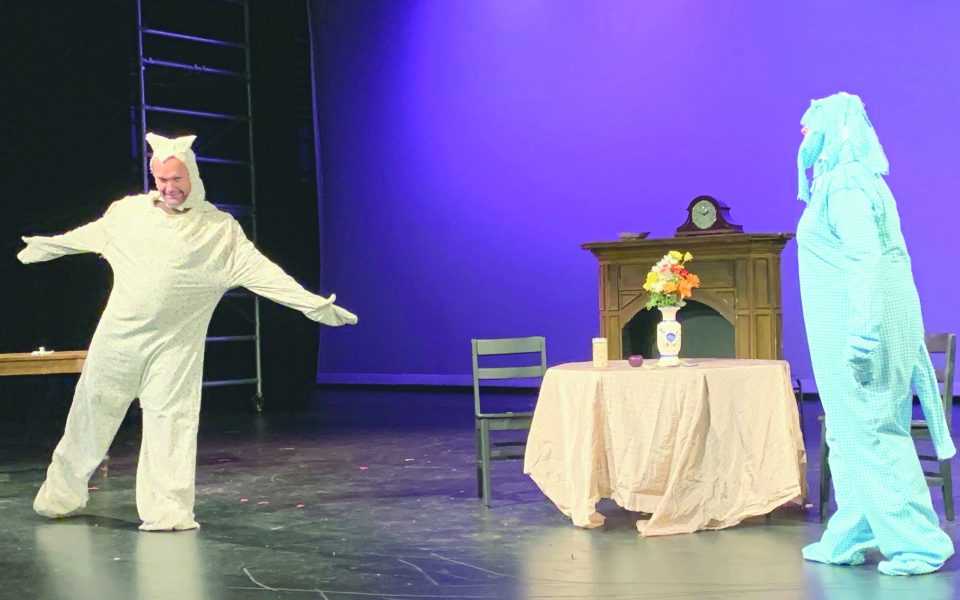It’s kind of like writing a short story,” Britt Stone says, “versus a novel.”
As the festival coordinator of the Ten-Minute Play Festival, Stone describes the night like a buffet of theater. As people walk to their seats before the show, she readies the cast and crew for a night of brief tales and quick trips into other worlds.
The collaboration between the Winston-Salem Writers and the Little Theatre of Winston-Salem highlights comedy, absurdism and drama in less time than it takes to have a pizza delivered. The Hanesbrands Theatre shifts and morphs again and again, stopping on each setting for less time than it takes to have a pizza delivered.
A writing competition determined the performances. From more than two dozen entries, seven were selected from North Carolina writers, four of which come from Winston-Salem. Stone revels in watching the different genres unfold.
“What I love most about it is seeing each of the plays is so, so different,” Stone says.
As the lights go up, the stage becomes a coffee shop stalked by a serial laptop thief looking for tables left unattended. He preys on those who ask someone, usually a stranger, to watch their stuff while they take a bathroom break. Not a quarter hour later, the same stage transforms an antique-looking den, where a child’s stuffed animal plans a runaway marriage with another. Quickly, the romance between patterned cat and dog morphs into a tale of heartbreak and betrayal.
Later on, Marilynn Barner Anselmi’s “The Assaults” sets a heavy fog of unspoken words and implications over the audience, as the audience eavesdrops on a discussion in a university office. In only 10 minutes, tension heightens between two students asking an administrator for help. The plot culminates with a twist line from the administrator, leaving audience members gasping though they met these characters less than a handful of minutes before.

The play is Tenesia Turner’s debut directing experience. She balances offstage work with acting as the administrator. She mentions the duality challenged her, but the short format of the work allowed her to step in and out of the scene to stay objective.
“Directing,” Turner says, “is a growth experience.”
Actor Ryan Howard says the festival gave him a chance to jump back onstage after college, playing roles in both the first and last play.
“It’s kind of reignited my appetite to get into theater again,” Howard says.
Stone hoped to use the length of the plays to draw upon new or emerging talent — like Howard or Turner — whether they worked as actors, directors or stagehands. Stone delighted in working with those who may not have the time or ability to commit to the schedule required of a full-length musical, or a dense two-act play.
“Our whole goal” she says, “was to invite people into theater.”
The invite reaches the audience. As the set hits its minimalist peak, four actors stand on stage in the same outfit white shirt and dark jeans. They face away from one another, their shoes strewn beside them. The somewhat absurdist piece, “After Before” written by Wake Forest University student Emma Szuba, follows four people at the apocalypse. They walk aimlessly barefoot as they contemplate the possibility of any of the Earth remaining, and whether or not their souls should move on or find a way back.
One man does jumping jacks to keep his eternal mind sharp, hoping to be the last one standing in the face of nothingness. Another man seems nervous. A woman lays on the floor, her curly hair spread over the dark wood. A second woman stands on the edge of an exit, looking off into the distance.
She decides there must be something left on Earth and to go back, a decision that — for her — took over three thousand years.
But for us, it lasts only ten minutes.
Learn more about the Winston-Salem Writers here , and the Little Theatre of Winston-Salem here.
Join the First Amendment Society, a membership that goes directly to funding TCB‘s newsroom.
We believe that reporting can save the world.
The TCB First Amendment Society recognizes the vital role of a free, unfettered press with a bundling of local experiences designed to build community, and unique engagements with our newsroom that will help you understand, and shape, local journalism’s critical role in uplifting the people in our cities.
All revenue goes directly into the newsroom as reporters’ salaries and freelance commissions.


Leave a Reply